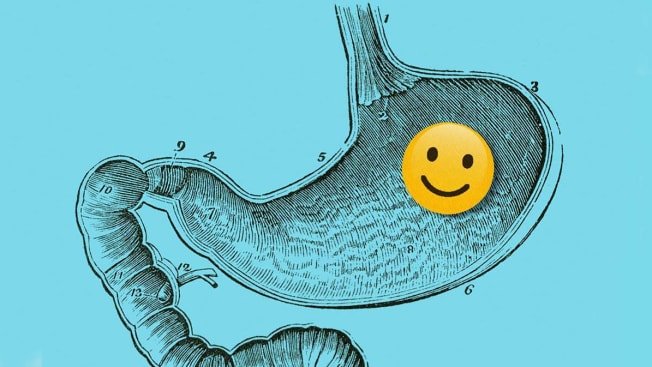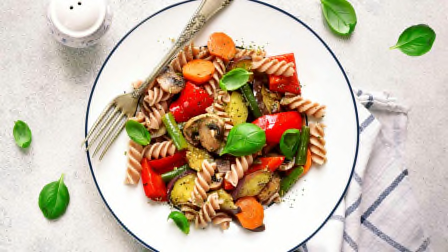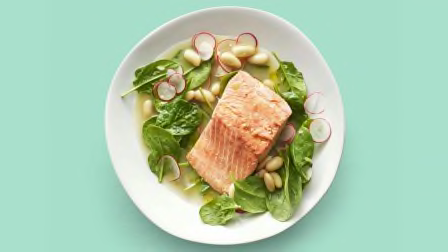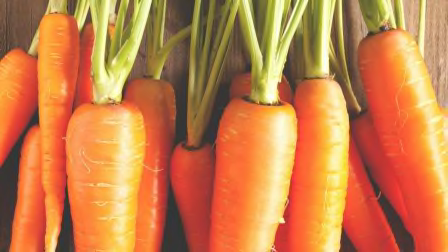6 Foods That Are Good for Gut Health
Adding them to your diet can bring relief for digestive woes

Whether stomach problems such as bloating, constipation, and gas cause you distress regularly or are just an occasional nuisance, you’re probably eager to get rid of them.
Like many other people, you may be tempted to try one of the growing number of foods and dietary supplements whose labels claim they will improve gut health. In 2019, U.S. consumers spent around $5.1 billion on digestive-health products such as antacids, laxatives, antidiarrheals, and other stomach remedies, and that figure is projected to increase, according to the market research firm Mintel.
The Three Major Players
For good gut health, experts suggest eating more foods that contain fiber, probiotics, prebiotics, or a combination of the three.
Fiber, found in plant foods, helps to regulate the speed at which food moves through your gut, making it a crucial factor when it comes to staying regular.
Probiotics in foods are beneficial microorganisms that are created through fermentation. You might think of them as “good” bacteria that can combat infection-causing microbes that are sometimes in the foods we eat or that thrive when we’re sick.
Prebiotics, simply put, are plant fibers that you can't digest but that serve as food for healthy bacteria in the gut. “They’re necessary in order for the good flora to flourish,” King says.
Here are some easy ways to work these three compounds into your diet.
High-Fiber Foods
The recommended daily intake of fiber is 25 grams for women and 38 grams for men (that's equivalent to about 2 and 3 cups, respectively, of cooked red kidney beans). If, like most Americans, you don’t get enough fiber, ramp up your intake gradually, over a period of six to eight weeks. Introducing too much fiber at once can cause its own set of bellyaches, including cramping and gas.
And because fiber works with water, be sure to stay adequately hydrated throughout the day to keep your digestive system functioning well.
To meet your daily fiber needs, try mixing and matching two or more of the following foods:
Legumes (chickpeas, lentils, navy beans, split peas, white beans): One cup of legumes can provide half your daily fiber, and at a cost of just pennies per portion, they’re a great deal, too.
If you’re concerned that legumes may cause you to be gassy, try soaking dried beans or draining and rinsing canned beans before cooking or eating. That may help reduce some of the sugars linked to gas. Research also indicates that the more frequently you consume legumes, the less likely you’ll experience gas afterward.
Raspberries and blackberries: A cup of these berries packs 8 grams of fiber.
Load up on frozen varieties when they’re out of season or on sale. Blend into smoothies or simmer with herbs to make savory sauces.
Barley, bran, and bulgur: All whole grains are generally good sources of fiber. But you can get 6 or more grams of fiber in a cup of barley or bulgur, or in just a half-cup of oat bran.
Because whole grains contain a bit of fat, they can become rancid when exposed to light, moisture, and heat. To extend the life of intact grains, store them in airtight containers in a cool, dark, and dry cabinet for up to six months. Ground whole grains (such as flours) should be stored the same way, but they still last only one to three months.
Probiotics and Prebiotics
Studies have found that foods containing probiotics can improve bacteria balance in the gut and possibly restore regularity in people with constipation. They may even boost overall immune function, and some evidence suggests that probiotics may shorten diarrhea related to antibiotic use, contaminated food, Clostridium difficile, or a virus.
Research is limited, so there are no specific recommendations on probiotic intake for gut health. “For most people, eating a variety of probiotic-containing foods most days of the week is enough to regulate digestion and relieve mild and/or occasional problems,” King says. Good options include:
Yogurt and kefir: Fermented dairy foods contain these beneficial bacteria, which help to break down some sugars—such as lactose—making them easier to digest.
Some studies show that dairy products with the probiotic Lactobacillus acidophilus, common in yogurts whose labels say they contain live strains, can be safely consumed by people who are lactose intolerant. “Just eat them as soon as possible, since the content diminishes the longer they are stored,” says Janet Colson, Ph.D., R.D., a professor of nutrition and food science at Middle Tennessee State University. (You may also see other probiotics, such as Lactobacillus bulgaricus and Streptococcus thermophilus, in the ingredients lists of some fermented dairy products.)
Kimchi: Because it’s made from fermented vegetables, this Korean side dish is a good choice for those who don’t consume dairy, and it’s a great source of dietary fiber, and vitamins A and C. Sauerkraut is another option.
Miso: In addition to containing probiotics, miso, made from fermented soybeans, is high in fiber and protein. To preserve the beneficial microbial content, add miso to foods after they’ve been cooked or heated.
You’ll also want to mix in some prebiotic-rich foods, such as asparagus, artichokes, bananas, garlic, leeks, onions, and soybeans.
Foods to Skip
Eating right and still having gastrointestinal trouble? Try eating more slowly and taking smaller bites. It may also help to avoid or cut back on the following foods and drinks:
Alcohol and caffeine: Both can overstimulate your intestines, which may leave you with diarrhea.
Sweetened fruit drinks: Blends containing high-fructose corn syrup may be difficult to digest and may cause abdominal gas.
Red marbled meats and fried foods: Fat slows digestion, so food sits in your stomach longer. And fatty foods can temporarily weaken the muscles that usually keep gastric acid in the stomach, leading to heartburn.
Sugar-free candies and gums: Some of them contain sweeteners such as mannitol, sorbitol, and xylitol—nondigestible carbohydrates that can cause abdominal gas, discomfort, and diarrhea in people who eat 10 grams or more daily.
Sodas and seltzers: Carbonated beverages can fill your stomach with gas.
Be sure to make an appointment with your doctor if adopting gut-friendly eating habits doesn’t resolve your digestive discomfort. “If the problem is chronic or severe, a physician may prescribe medication or check you for a digestive disorder such as celiac disease, irritable bowel, Crohn’s disease, or ulcerative colitis,” King says.



















